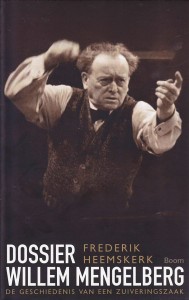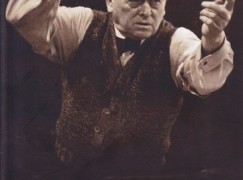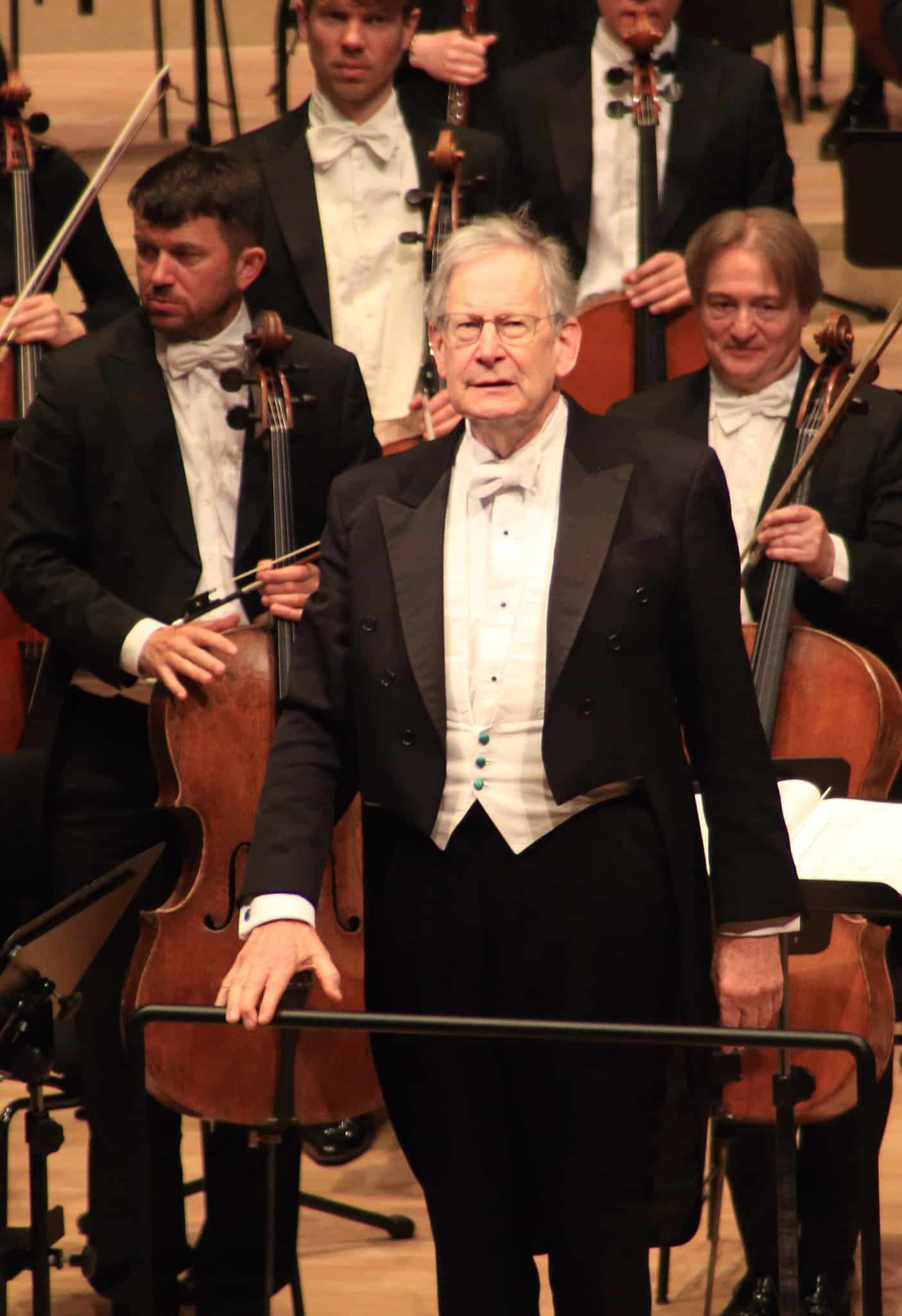Reopening the Mengelberg case: Was he justly banned?
mainWillem Mengelberg, conductor of the Concertgebouw orchestra for half a century and its defining personality, was banned from conducting in Holland after the war because of his pro-German sympathies.
Now Frederick Heemskerk, a former criminal court judge in The Hague, has reopened the case in a book published this week. Heemskerk is presently chair of the engelberg Society, so there’s no question where his sympathies lie, but does he have new evidence?
The book is in Dutch. Which of our Netherlands readers would like to write the first review?







I have not read it and am not intending to, but this book seems to be a pointless undertaking. Mengelberg drank champagne with the German military staff on arrival of the German army in Amsterdam and happily cooperated with the regime during the occupation, which was a thoroughly traumatisizing experience for the Netherlands, still echoing through the generations. He himself being German, and apparantly oblivious of what had been happening in his homeland, or willing to close his eyes, one could with some effort find some little bit of understanding, but there is no excuse for him, not even posthumously.
There are 2 things he left for posterity to comtemplate: great musical artistry and succumbing to the weakness of many artists under dictatorships (as we now see again with the Putin/Gergiev question).
Mengelberg was not German, his parents were. He was born in Utrecht. Whatever he did wrong during WW II, he was severely punished for it and never recovered from it.
I think Heemskerk’s main argument is that Mengelberg didn’t have a fair trial, if only because he wasn’t even allowed to defend himself or make a statement, simply because he wasn’t allowed to travel back to Holland from Switzerland (the Dutch government refused to give him a passport).
Mr. Borstlap. I do not doubt your best intentions, but if preventing something horrid as the nazi regime from happening is your goal, I’d say you have to brace yourself intellectually. On one hand you post several things that are simply not true (Mengelberg was not German, he never toasted with military staff to the occupation), you refuse to broaden your horizon by saying “I have not read this and have no intend of doing so”. This kind of ignorance is most dangerous and we can’t afford such behavior if we want our world to be a better place.
Agree with John.
Nothing to add
It will be interesting to see what he might have uncovered. Mengelberg was undoubtedly a great conductor, regardless of what happened with him during the nazi era.
As with Wagner, art for art’s sake.
Maybe, but never let it be an excuse to condone an artist’s abhorrent views.
I think Mr. Borstlap is depicting things a bit too simple and uses half-truths to support his opinions.
First off, Mengelberg was not German himself, but of German descent. His parents were Catholics (converted) and had moved to Holland after the Catholicism was allowed again in the Netherlands in the 19th century. Mengelberg considered himself Dutch throughout his life.
2) He never toasted with military honoraries to the invasion of the Netherlands. He was travelling for concerts when the news arrived that Holland had been occupied and – the accounts differ on the exact circumstances – he toasted in private circle to the well-being of Holland. Whether this was to celebrate the new occupation, or to toast to the well-being DESPITE the occupation is not proven and will probably never be. Whoever claims to know more about this is merely speculating.
3) The only thing he could be accused of, was an interview he gave in Berlin after the occupation. In this interview he stated that “due to the strong cultural ties to Germany” it was better the way it was now, rather than being occupied by the other side and the ties to Germany being cut off. He received a lot of criticism for this later on and apologized for this, even though he seemingly never understood what the great commotion was all about.
4) There’s more than one account on which his doubts towards the German regime were expressed in words and actions. In a letter from 1933 (after Hitler came to power) Mengelberg wrote to the Dutch foreign ministry that he had serious doubts about continuing his performances in Germany (which he was actually contractually obliged to by Telefunken). The answer from the foreign ministry left no doubt: “No, you HAVE to go, it is good for the Dutch-German relations!” (sic!) It would be the same people that send him there, that would accuse him of being a traitor after the war.
5) Another example was the question of the regular guest conductor. The Nazis demanded, that the regular guest conductor of the Concertgebouw had to be a German, preferably a Nazi. To prevent that from happening, Mengelberg made a strong case for Eugen Jochum to be appointed, who was German, but who was a fervent Catholic and Anti-Nazi.
6) One of the most common accusations was his “willing cooperation”. One wonders how the Concertgebouw Orchestra (and it’s Jewish musicians) would have fared if Mengelberg would have openly rebelled against the occupiers. It is rather easy to sit in a comfy chair and announce that “I would have rebelled”, but when faced with possible persecution and death, reality looks often different. If Mengelberg had opposed the Nazis openly, he would have been removed from his post and a real Nazi would have been appointed. Do you think ANY of the Jews in the orchestra would have survived that?
7) This is also backed up by several letters from former orchestra members to Mengelberg after the war (when he was already in exile). These were written by jewish orchestra members that expressed their gratitude to Mengelberg for protecting them from deportation and basically saying that they are eternally grateful to him because he saved their life! Several of these letters also hint at the “witchhunt” that was taking place right after the war and that they found in unjust.
I think Mengelberg could care less about this, but how is it that Oskar Schindler gets his own movie and monument, but Mengelberg – for more or less the same deeds – is still considered an inexcusably weak person?
In case anybody is wondering, I’m not a member of the Mengelberg society (not anymore, in any case), but I wrote my master thesis about Mengelberg and his conducting style. During the years prior to that I did a lot of research and can back all that I’ve just said up with source-material. For everybody who is interested in facts, and not just hear-say, I highly recommend to read the Mengelberg biography by Frits Zwart. It is a modern and scientific approach to this person and should help us see the past in color, and not just in black and white.
A lot of the discussion surrounding Mengelberg is unfortunately still very loaded and often fueled by own political agendas (like somehow getting Putin and Gergiev into it). I think this new book could be a valuable addition to the discussion and I expect it to be up to scientific standards. Anything else would disqualify itself.
That being said, I’d love to review it, where do I get it?
It is published by Boom: http://www.uitgeverijboom.nl
A fascinating account of his trial at the “Honour Council for Music” after the war; very well researched and convincingly written. Highly recommended.
Yes, how nice. So he saved the lives of a few Jews in the orchestra – while every other Jew in the Netherlands was deported by his acquaintance Seyss-Inquart. Sorry, this is not Schindler. Schindler was a German, and he saved Jews by the hundreds, deliberately recruiting them for his factory so as to get them out of the murderous claws of the SS. Mengelberg did nothing of the kind. His behaviour was more like that of the many Nazi party members that Himmler would complain about, who “each of them had his good Jew”.
Whatever hapened to Mangelberg was far better than what his nazi pals did to ordinary musicians. Whatever happened to him could have happened to the likes of Toscanini or Lotte Lehman or Paul Paray- among those who were not afraid to risk their fame and fortune for human decency. Except those other musicians had consciences and souls and had no need- afterthe war- to invent excuses The little slob got what he deserved. That he lived at all after the war was better than he deserved.
That Mengelberg lived at all is better than he deserved~~~~ Such a statement speaks for itself. In other words, a conductor who refuses to emigrate is a war criminal deserving of death. Perhaps Richard Strauss should have been killed too.
In hindsight it is easy to say what one should or should not do. By the way, emigrees hated the nazis but once in America were personally safe. Furtwangler and others may have been ill advised to stay, but were definitely NOT SAFE.